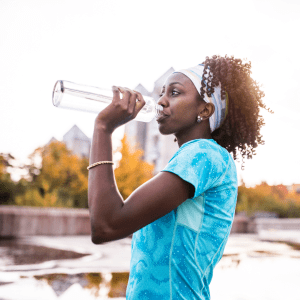As we grow older, it’s important that we keep our bladders healthy, and you’re never too old to start practicing good bladder health!
A healthy bladder greatly reduces the uncomfortable, and sometimes painful, effects of incontinence and overactive bladder. Let’s take a look at 10 easy tips you can follow for a healthier bladder.
Make sure you’re drinking enough fluids.
It’s important that you drink enough fluids each day and the amount of water you need to consume can be affected by your height, weight, how active you are, climate and existing health conditions.
Use the bathroom often.
Holding urine in the bladder can weaken your bladder muscles – a healthy bladder is a muscular one! Aim for using the bathroom at least once every three to four hours.
Stay in a relaxed position when urinating.
Relaxing your bladder muscles will make it easier for you to fully empty your bladder when urinating. If urine remains in your bladder for too long, it increases your risk of bladder infection.
Monitor the foods and liquids you’re consuming.
Certain foods affect us differently than others. Changing your diet may help you to get control over bladder issues. Caffeinated drinks can lead to an overactive bladder and create an increased sense of urgency.
Quit smoking and limit your alcohol intake.
Bladder issues are common among individuals who smoke and alcohol can also disrupt bladder health.
Wear loose-fitting clothing and cotton underwear.
Tight-fitting clothing can trap moisture and lead to bacterial growth. Loose-fitting clothing helps you stay comfortable and work toward a healthy bladder!
Always urinate after sex.
Both men and women should urinate shortly after sex, as bacteria from the bowel or vaginal cavity could move close to the urethra. Urinating will help reduce the risk of bladder infection.
Make sure you’re exercising often.
Physical activity can assist with bladder control, reduce constipation and help you maintain a healthy weight.
Practice pelvic muscle exercises.
Exercising your pelvic muscles will strengthen the bladder and help hold urine in the bladder when coughing, sneezing, lifting, jumping or laughing. These exercises can assist in preventing bladder spasms and help your body fight against incontinence.
Know the side effects of your medication.
Some medications may have an effect on your bladder’s ability to hold urine or reduce your urge to go to the bathroom. Ask your doctor about any symptoms that give you concern.
At Arkansas Urology, we’re here for you. Our patients’ health has been and will always be our top priority! Do you need to schedule an appointment? Contact us today or book your appointment online. We look forward to seeing you soon.




